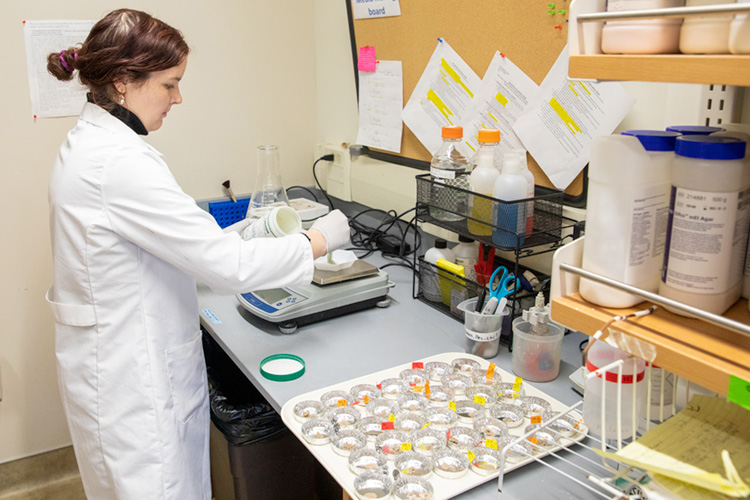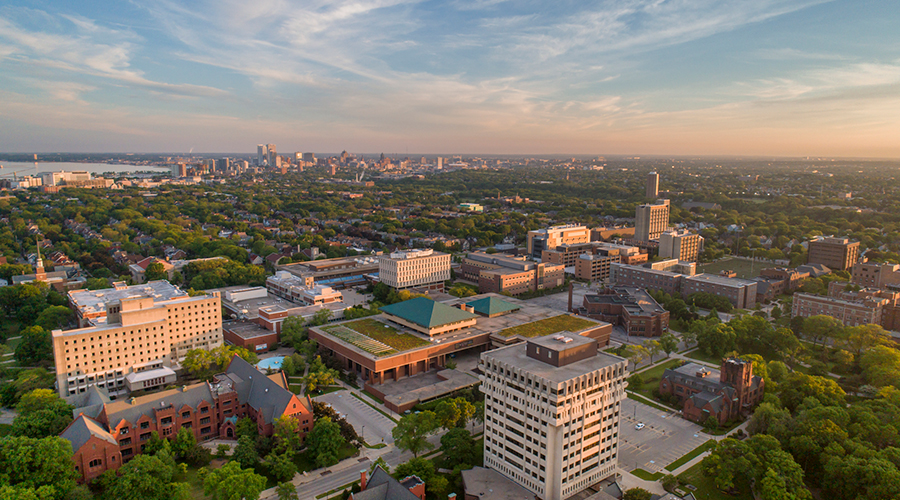PhD: Freshwater Sciences PhD
Are you committed to exploring, protecting and preserving one of our most vital natural resources? Do you like digging into complex scientific problems to discover solutions? Explore a freshwater sciences PhD.
Our PhD in freshwater sciences is a dissertation-based program that prepares you for a rewarding career in academia, research or industry. In fact, 100% of graduates from our PhD program have gone into a water-related job after graduation. With a strong emphasis on research, doctoral students concentrate on complex interdisciplinary issues through a well-defined focus of study. You’ll have the opportunity to work alongside some of the world’s leading freshwater scientists while advancing critical research.
Program Type
Doctoral
Program Format
On Campus
Research That Makes a Difference.
Our faculty are studying everything from aquaculture to contaminants to ecosystem health. Our freshwater research affects freshwater systems worldwide. We are also home to the Great Lakes Genomics Center and the Center for Water Policy.
As a freshwater sciences PhD candidate, you will discover how your research can influence the health of water ecosystems. Explore our freshwater research.

Science That Solves Freshwater Challenges
We’re preparing the next generation of scientists, researchers and policymakers who are committed to exploring, protecting and preserving one of our most vital natural resources. While earning your freshwater sciences doctoral degree, you will
- Explore natural and human-created freshwater systems.
- Learn from world-class faculty within a small-class environment.
- Build a multidisciplinary science foundation.
- Gain research experience working in a scientific lab.
- Receive mentorship from a leading freshwater researcher.
Students in the freshwater sciences PhD program must be accepted by a faculty member who will serve as the major professor and be primarily responsible for matriculation.
The School of Freshwater Sciences admits new thesis students for fall and spring semesters.
- Fall applications are due January 31
- Spring applications are due October 1
You must meet Graduate School requirements in addition to the following to be considered for admission:
A bachelor’s degree in biology, chemistry, economics, geosciences, mathematics, physics, public policy, or other appropriate natural science, social science or engineering discipline.
Applicant must have at least a 3.0 undergraduate GPA. All of an applicant’s undergraduate coursework completed before award of the first undergraduate degree is included in the GPA computation. For courses that were repeated for credit, each attempt is included.
Those whose undergraduate GPA is below 3.0 should contact Aaron Thiel, Graduate Program Manager, for guidance. Applicants may be considered for admission if they are able to provide evidence of their ability to succeed in graduate study.
All applicants, including UWM students, must upload an official or unofficial transcript into the Panthera admission application system for all work done at higher education/postsecondary institutions. All applicants who are admitted to the Graduate School will be required to submit an official transcript with the degree posted within two weeks of the beginning of their first semester of enrollment.
The reason statement is an essential part of the application. It is used to determine the appropriateness of your educational and professional goals and serves as an example of your ability to express yourself in writing. Your reason statement should include:
- your reasons for pursuing graduate study
- your specific background interests and background in the field
- any relevant skills or training you’ve acquired
- any academic awards or honors you have received
Submit a current resume that clearly articulates your professional experience.
Submit a scholarly writing sample that demonstrates critical thinking and writing skills.
Three letters of recommendation are required by persons who can attest to your scholarship and/or research potential and your success in graduate school at the School of Freshwater Sciences.
List relevant courses taken at previous institutions. Please include course number, course title, credits and final grade (example: BioSci 150, Foundations of Biological Sciences, 4 credit, A-). The following prerequisites are strongly recommended:
- at least one semester of any three of the following topical areas: chemistry, biological sciences, physics and calculus
- one additional semester of chemistry, biological sciences or physics
- UWM Institutional Code for the GRE: 1473
Students must earn 54 credits beyond the bachelor’s degree, of which 24 credits may be taken from formal coursework completed as part of a master’s degree. A minimum of 27 credits must be earned in residence at UWM. Students may take up to a maximum of 6 credits of independent study counting toward the degree.
| Code | Title | Credits |
|---|---|---|
| Required | ||
| FRSHWTR 585G | Applied Water Statistics and Data Manipulation | 3 |
| FRSHWTR 890 | Science Communication | 3 |
| FRSHWTR 900 | Colloquium in Freshwater Sciences (taken twice, 1 credit each) | 2 |
| Select one of the following: | 3 | |
| FRSHWTR 502G | Aquatic Ecosystem Dynamics | |
| FRSHWTR 504G | Quantitative Freshwater Analysis | |
| FRSHWTR 506G | Environmental Health of Freshwater Ecosystems | |
| FRSHWTR 508G | Aquatic Technologies | |
| FRSHWTR 510G | Economics, Policy and Management of Water | |
| Electives | 15 | |
| Select 15 credits in consultation with the students major professor | ||
| Research, Dissertation, Independent Study, or Remaining Electives 1 | 28 | |
| FRSHWTR 990 | Doctoral Research and Dissertation | |
| FRSHWTR 999 | Independent Study | |
| Total Credits | 54 | |
Doctoral students are typically funded through faculty research projects. We strongly recommend you reach out to faculty members whose interests align with your own to discuss potential research and funding opportunities. Current research assistantship opportunities.
The School of Freshwater Sciences also offers competitive assistantships and scholarships. For more information about other financial aid options, please visit UWM Financial Aid.
Every one (100%) of our PhD candidates have gone into water-related jobs after graduation. A number of PhD candidates at the School of Freshwater Sciences have been chosen for the prestigious Sea Grant Knauss Fellowship Program, which provides a unique educational and professional experience to graduate students who have an interest in ocean, coastal and Great Lakes resources and in the national policy decisions affecting those resources.
Others have secured positions at Duke University, the University of Colorado, Woods Hole Oceanographic Institution, and working for natural resourced departments in several states.

